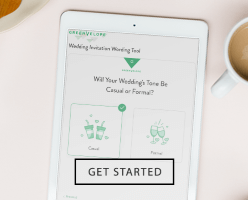How To Create a Wedding Budget for Your Dream Day

Setting a wedding budget can seem like a daunting task. You might have no idea how much it will cost, how long you’ll need to save, or how to manage your expenses to achieve the results you want. Aside from the hard costs of the wedding itself, there are also many other components that add to your wedding budget, including beauty treatments, bridal party gifts, and transportation.Â
If you’re not sure where to start, don’t worry. This guide offers an easy way to figure out your wedding fund, including a wedding budget breakdown that’ll help you plan the celebration of your dreams.
How Much Does a Wedding Really Cost?
The beauty of planning a wedding is that you can create something amazing to suit any budget. You could go all out with a $50,000 luxury destination wedding or a wonderful DIY micro wedding for under $2,000. There’s magic to be made at every budget point.Â
In 2019, the average wedding cost was nearly $25,000, and chances are that number is only going to increase. That said, these figures also vary significantly by state, with Hawaii topping the list as most expensive. Of course, averages take into account everything from celebrations with hundreds of guests to ceremonies with a much smaller guest list. Still, it’s a helpful starting point if you’re just starting to think about your wedding funds.Â
How To Set Your Wedding Budget
Knowing the average cost of a wedding is great, but everyone has different incomes, lifestyles, and desires for their big day. Here’s how to set a wedding budget that takes all this into account, so you can begin planning your ceremony and reception with confidence.Â
Know Your Income and Savings
When planning your wedding budget, the first thing to do is review your income and savings as a couple.Â
Take a look at your household budget and identify how much money you could save each month towards your wedding fund. You might want to keep your lifestyle as it is, or you could make changes and live a little more frugally to contribute more to your wedding fund.Â
You also want to review how much you have in your savings accounts.Â
You might have been saving for the last few months or years with a wedding in mind, or you might be starting fresh. Maybe you’ve been saving for a down payment on a house or a dream getaway and want to use some of these funds for your wedding instead.
Once you’ve worked out your finances as a couple, you’ll have a good idea of what’s achievable. Not only will this help you set your wedding budget but it can help you decide on a date too — if you don’t have the funds now, you can always plan your wedding for the following year.Â
Just remember to be responsible and don’t empty your bank account. You deserve to have a wonderful wedding, but you also don’t want to go into debt or be left with no savings just to make it happen. After all, your wedding is just one day — and it will be memorable no matter what. But your marriage will last a lifetime. You want to start your journey together on solid financial ground.Â
Discuss Finances With Family
Discussing finances with family can be tricky, but it’s another way to potentially increase your wedding budget or make your money go further.Â
Family help doesn’t have to mean a massive contribution to your venue costs — it could come in the form of contributing to photography fees or using connections to get you a discount on your wedding flowers.Â
Not everyone’s family will be able or willing to contribute, and that’s OK. But having a conversation with them could be a way for them to throw in some new ideas about more affordable venues, or they might know a great DIY trick that’ll save you hundreds on your decor.Â
Be Realistic
Weddings can be incredibly expensive. Venue rentals can run into the thousands, and that’s not even factoring in costs like tips and transport. As you plan your wedding budget, stay realistic about what’s practical — both in terms of money and time.Â
To secure the venue you love at a price that works for you, you might have to opt for a weekday wedding or book your date a year or more in advance. (Note: Planning your event well in advance can often save money.) If you need a venue fast, your choices will be more limited and prices will likely go up.Â
The same goes for other parts of your wedding, like catering and alterations. There’s a careful balancing act between deadlines and prices when it comes to wedding expenses. If you’re short on time, chances are you’ll end up paying more to get what you want.Â
Staying realistic about what your wedding budget can handle will help you navigate wedding planning with more confidence and joy. It’s better to enjoy those moments searching for the perfect venue within your budget than to tour places you love that are beyond your budget range.Â
Decide on Your Non-Negotiables
For most couples planning a wedding, there are a few things each person can’t imagine budging on. It’s critical to define these non-negotiables since they’ll influence how you allocate your wedding budget.Â
You might have your heart set on a specific venue in a town that you love, while your partner might have a large family who all want to celebrate with you. Maybe there’s a band you’d love to have at your reception, or you want to fill the venue with gorgeous fresh flowers. Everyone has their “thing” and it’s important to make that a priority if it matters to you.
Once you’re clear on your non-negotiables, you can be a little more relaxed about the other elements of your wedding. Sure, your wedding menu is important and you want to feel amazing in whatever you wear. But you can be more flexible in these areas knowing that your non-negotiables are set.Â
How To Organize Your Wedding Budget Expenses

With a better understanding of your finances and non-negotiables, it’s time to start setting your wedding budget.
You don’t want to set it and forget it, so create a spreadsheet to track your wedding budget or use a paper planner to organize your wedding finances. Spreadsheets are great because you can edit them as things change and use formulas to help you stay on track.Â
Split your wedding budget into categories to ensure you have everything covered. It’s also a great idea to assign each category a percentage of your budget. This helps you visualize the areas that are most important to you, and helps you see what you’re spending at a glance.
How you prioritize the categories is up to you. For most couples, the wedding venue will take about 25% of the total budget for the big day. You might increase this if you want to book an in-demand venue, or reduce it if you’re hosting a backyard wedding.Â
Photography is another expense that will depend on how you choose to handle it. For example, you could spend up to 20% of your budget on photography if it’s a must-have. Or you might have a photographer friend who will shoot your wedding as a wedding gift.Â
Below are all the categories you’ll want to cover for your wedding budget, along with some suggested items for each.Â
Wedding Ceremony
- Marriage license
- Officiant fee
- Ceremony venue costs
- Ceremony decorÂ
- Live music
- Wedding rehearsal costs
- Wedding insurance
Reception Venue
- Venue deposit
- Rental fees
- Tax and service fees
- Venue rentals — like linens, centerpieces, and tableware
- Gratuities for service staff
Entertainment
- Live band or performer fees
- Children’s entertainment
- StageÂ
- Lighting
- Power supply
Decor and Flowers
- Consultation with a florist
- Bridal bouquet
- Bridesmaids bouquets
- Groomsmen’s boutonnières
- Ceremony flower arrangementsÂ
- Venue flower arrangements
- Flower walls or arches
- Centerpieces and floral displays
- Candles and decorative lighting
- Bunting, balloon arches, and similar accents
- Signage
- Delivery, setup, and removal feesÂ
Food and Drink
- Rehearsal dinner
- Appetizers for cocktail hour
- Reception catering — whether it’s a sit-down meal, buffet, or an alternative
- Meals for wedding vendors
- Wedding cake and/or cupcakes
- External caterers, such as food trucksÂ
- Drinks for cocktail hour and reception
- Drinks for toasts
- Beverages — both alcoholic and non-alcoholic
- Tea and coffee
- Corkage fee
- Open bar
- Bar service
- Service fees and tips
- Post-wedding brunch
Attire
- Wedding dress(es)
- Veil, tiara, or other bridal accessories
- ShoesÂ
- Wedding suit(s)
- Wedding party ensembles (if supplying or contributing)Â
- Underwear and hosiery
- Clothing alterations
- After-party outfit (if applicable)Â
- Wedding dress cleaning and storage
Rings
- Engagement rings
- Wedding rings
- Resizing
- Cleaning and aftercareÂ
Photography and Videography
- Engagement photoshoot
- Wedding day photography
- Wedding album
- Photo prints
- Wedding video
- Mini film for social media
- Feature filmÂ
- Photographer and videographer transportation and expenses
Beauty
- Haircuts and coloring
- Professional shave
- Beauty treatments — like facials, massages, and manicures
- Trial appointments for hair and makeup
- Wedding hair styling
- Wedding makeupÂ
- Hair and makeup for the wedding party (if providing)Â
Transportation
- Transportation for wedding party
- Transportation for close family members and friends
- Shuttle service for wedding guests
- Service fees and tipsÂ
- Parking feesÂ
- Transportation costs relating to wedding supplies, decor, or entertainment
Wedding Favors and Gifts
- Gifts for the wedding party and family
- Party favors for wedding guests
- A gift from you to your partner on your wedding day
Stationery

- Engagement party invitations
- Save the dates
- Wedding invitations
- Thank you cards
- Postage (if you’re not sending digital invitations)
- Ceremony programs
- Place cards
- Menu cardsÂ
- Printed wedding reception games
- Guest book
Don’t worry if your list looks a little different — these ideas are here to help you get started. If you have a wedding planner, you’ll also need to include their costs. You might also want to capture other areas of your wedding journey here, like your engagement party or honeymoon fund. It’s all about what works best for you.Â
Plan Your Wedding Budget With Confidence
Wedding planning doesn’t have to be confusing. Use the tips and wedding budget categories in this guide to help you create a well-organized and easy-to-follow template to plan and track your spending.Â
One of the easiest ways to save money and time is by sending digital wedding invitations. You don’t have to worry about costly stationery yet you can have the most stunning designs with limitless customization options. Plus, you have the bonus of seamless RSVP tracking and other features that let you easily communicate with your wedding guests.
Once you’ve determined a wedding budget, you can get to work on securing your venue, dreaming up your decor, and sampling those all-important tasting menus. No matter how much (or how little) you have for your wedding budget, enjoy the journey and remember that it’s not just about one day, it’s about forever after.


